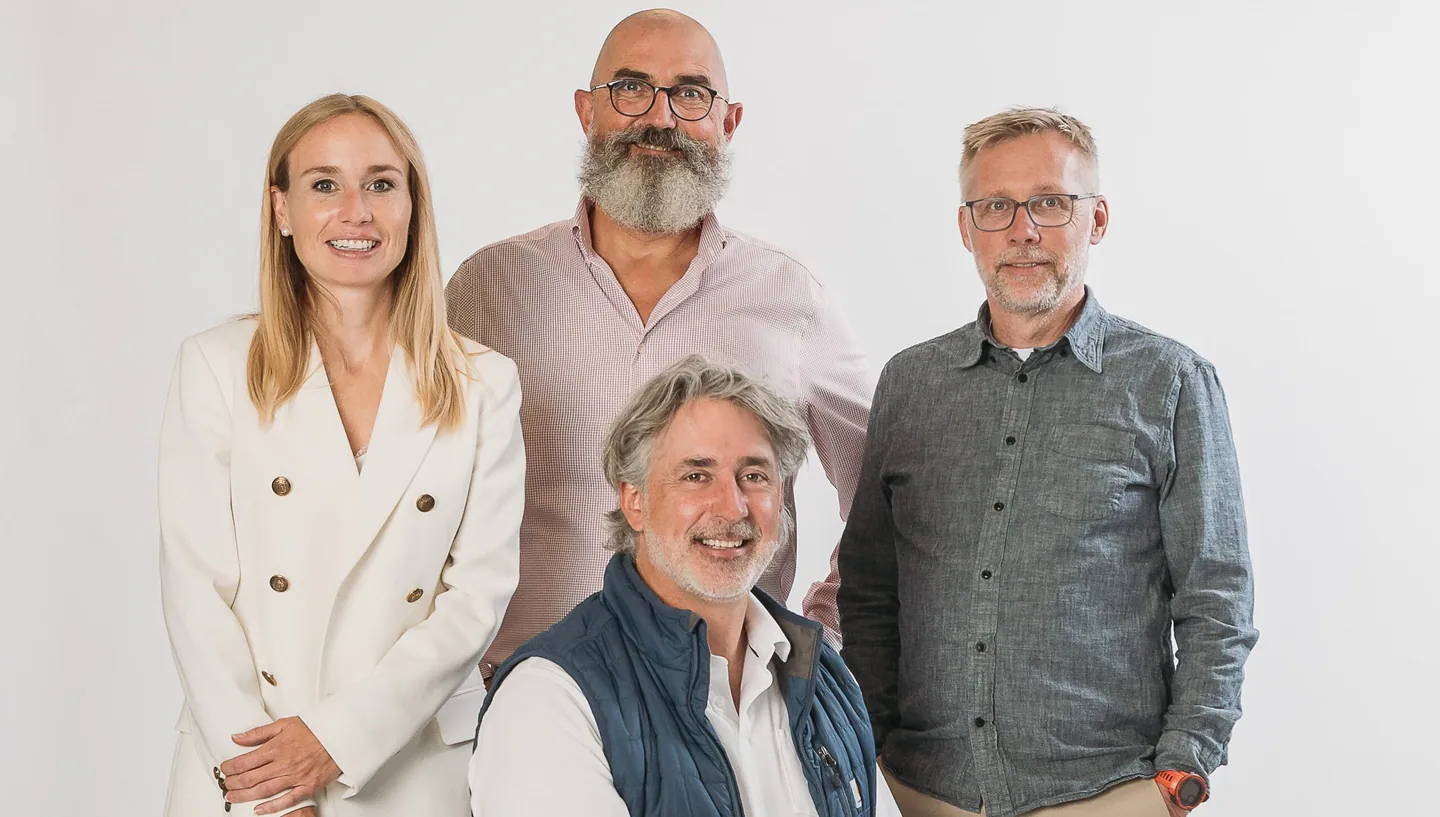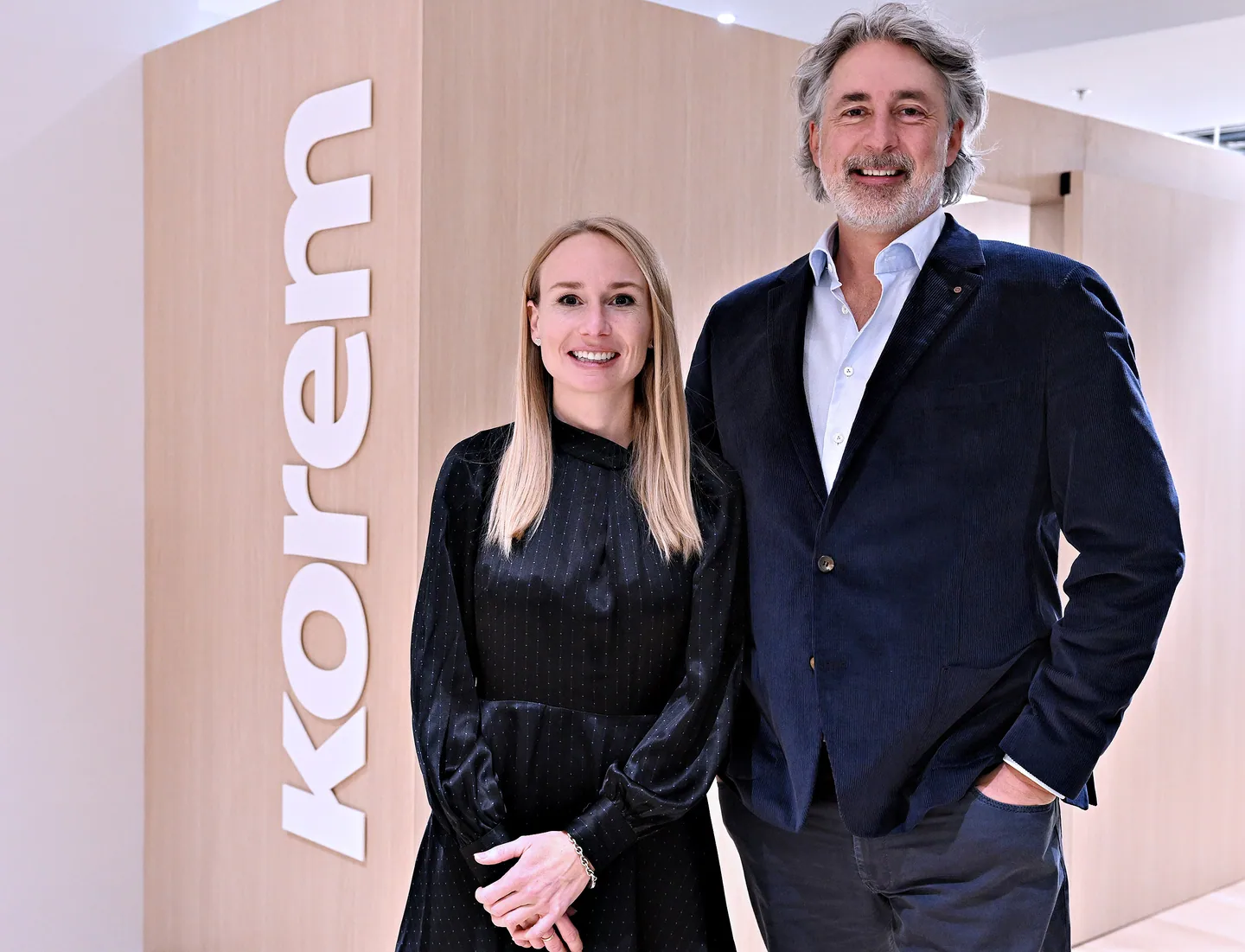Sébastien Vachon Serene as he Embarks on His New Adventure

Sébastien Vachon (Erick Labbé/Le Soleil)
After 30 years leading Korem, Sébastien Vachon has handed over the reins to a new management team. While remaining Korem’s values keeper, he will now focus on his development projects in Saint-Tite-des-Caps.
Q. What have you learned out of your 30 years at Korem
A. As the AC/DC song goes, ‘It’s a long way to the top (if you wanna rock ‘n’ roll)’, my journey has been a long road to the top. Becoming a business leader was a matter of circumstance. I had a challenging academic path. Eventually, I ended up studying geography at university.
In the 90s, when you were lucky enough to have a job, you hoped to keep it. When I first thought of starting a small company with a university colleague, I dreamed of earning $60,000 a year. We believed that geography would become an important element in the future, but Internet was new, and Google Maps didn’t exist yet. We had the right vision at the right time.

Sébastien Vachon (Erick Labbé/Le Soleil)
The company grew gradually. I was fortunate be surrounding with extraordinary people that could make up for my weaknesses.
Korem generates 30 million dollars in sales, and 60% of our revenue is generated in the United States. We employ 96 people, including 75 people in Quebec. We are a human-scale company, and that’s perfect. It suits me completely.
Q. How long have you been thinking about your business succession plan?
A. Over the past 30 years, I had a lot of fun, but there were also very difficult years. I walked on the edge of the precipice for at least 25 years. Every aspect was fragile. I could have lost my two major customers or some of my staff… All these factors caused a lot of psychological fatigue. I had panic attacks. So, I decided to step back to take care of myself and embark on another adventure.
I have been thinking about my business succession plan for six years, and it is with three people in leadership roles. Christophe Charpentier (CEO), Marise Drapeau (Vice-President of Finance), and Rémy Pelletier (Vice-President of Professional Services).

Marise Drapeau, VP of Finance and Administration, Christophe Charpentier, CEO, Rémy Pelletier, VP of Professional Services, and Sébastien Vachon, Chairman of the Board (Korem)
I definitely stepped down as CEO six months ago. I am now the Chairman of the Board and owner of Korem. I have become the values and vision keeper.
Q. You chose a president who lives in California. What is your view on remote work?
A. Before the pandemic, I had approached Christophe about taking over my role, but as I was asking him to leave California to settle in Quebec, the deal fell through.
Contrary to what some media have written, since the pandemic, I have become a strong advocate of remote work. Without remote work, my company would be closed today. It’s impossible to ask people to come to the office five days a week in Saint-Roch (Quebec) with the current offer. Thanks to remote work, we have people who are living their dreams. We have employees in Montreal, Trois-Rivières, and Gaspésie.
And it’s not because you work 100% remotely that you can’t be promoted within the organization.
Q. What is the future of the office?
A. My position in favor of the office is a personal belief. For development and innovation, a company needs humans who collaborate.
“I am also a defender of mental balance. Managers must detect when it’s time to organize a team meeting at the office.”
In my opinion, the hybrid model is a good compromise.
The biggest challenge is to make people, especially experienced people, understand how important they are in the life of an office. So, I say to people: remember when you came in as an intern or a junior employee. Colleagues helped you. Relationships were forged. Throughout the year, we organize four mandatory gatherings for all employees. Directors manage their teams as they wish and according to needs.
Q. Starting in January, Korem employees will have Fridays off. Why this choice?
A. For the past four years, we have been working on implementing a four-day workweek. It’s not a formula taken from a book. There was a lot of thought put into finding the best approach.
We were losing five to seven hours of work each week for various reasons: too many meetings, unclear requests, poor planning of work to be done. We identified these time losses and now, with this additional day off, we realize that people are more productive and innovative.
Initially, we started with one Friday off per month to test the concept. Then, we moved to two Fridays per month. Starting in January, we will give our staff every Friday off. Employees will work 34 hours a week.
Q. What are the opportunities for Korem in 2024?
A. We have ambitious but achievable goals. We will focus on our expansion in the United States. This is the first time Korem hired someone of Christophe Charpentier’s caliber. He has significant experience in a large company, Amazon.
It’s very stimulating for the team because, at some point, I too have my limits. They have been reached a long time ago. I have always worked at Korem.

Sébastien Vachon and Marise Drapreau, Vice-President of Finance and Administration. (Erick Labbé/Le Soleil)
Marise Drapeau has been working for Korem for 10 years. She will be the face of Korem in Quebec. A company must be well managed. Finances are too often trivialized. The success of the organization is to feed the entrepreneur about the financial reality and their address their ability to carry out projects. Without this, you live in a fantasy world.
We are moving away from family management, the attraction is strong among our clients and partners. Korem has never had such a strong positioning.
Q. How will you keep busy now that you’re no longer at the head of Korem?
A. I have created projects elsewhere to challenge my entrepreneurial side. I wanted to ensure that my shadow, my involvement in Korem, was not too strong.
Saint-Tite-des-Caps is a place I fell in love with, initially because of projects for Korem. Four years ago, I acquired the former Station Blü, which had gone bankrupt. The idea was to create a place to receive customers and partners. It will be delivered in January.
We managed to get through the pandemic in the first year because we had a close-knit team. People know each other less and less. I’m worried about the reaction to a new crisis like COVID-19.
“ My challenge is to create opportunities to bring people together. I’m a great believer in small pleasures. People around a good meal and a bottle of wine.”
My parents were not entrepreneurs, but they were involved in local development. I’ve heard about this all my life. I’m going back to things I’m comfortable with, things that make me happy. I need to be with people; that’s what has made me successful.
I fell in love with this municipality. It’s an underrated place. And then, at one point, the restaurant Chez Rita was for sale. There’s also the funeral center. I had planned to turn it into a coworking center because more and more people are working remotely. But for now, I’m focusing more on the restaurant to make it profitable.
Article written by: Céline Fabriès, Le Soleil
Céline Fabriès has been a journalist at Le Soleil since 2018. After a few years in reporting and digital editing, she began a new assignment entirely dedicated to reporting in 2023. She covers the business sector and the Beauce region.
*This is a translation of the original article published by Le Soleil. For the complete and authentic article, please refer to the original publication.



